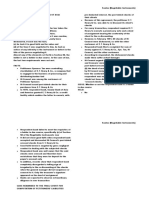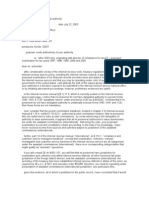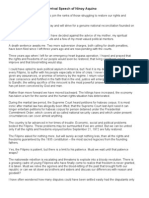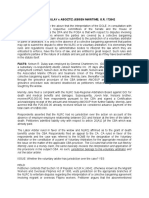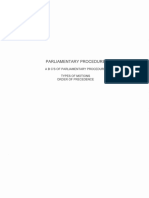G.R. No. 128524
G.R. No. 128524
Uploaded by
kishen kateCopyright:
Available Formats
G.R. No. 128524
G.R. No. 128524
Uploaded by
kishen kateCopyright
Available Formats
Share this document
Did you find this document useful?
Is this content inappropriate?
Copyright:
Available Formats
G.R. No. 128524
G.R. No. 128524
Uploaded by
kishen kateCopyright:
Available Formats
[G.R. No. 128524.
April 20, 1999]
GOVERNMENT SERVICE INSURANCE SYSTEM (GSIS), petitioner, vs. THE HONORABLE COURT OF
APPEALS and FELONILA ALEGRE, respondents.
ROMERO, J.:
FACTS:
Private respondent Felonila Alegre’s deceased husband, SPO2 Florencio A. Alegre, was a police officer
assigned to the Philippine National Police station in the town of Vigan, Ilocos Sur. On December 6, 1994, he
was driving his tricycle and ferrying passengers within the vicinity of Imelda Commercial Complex when SPO4
Alejandro Tenorio, Jr., Team/Desk Officer of the Police Assistance Center located at said complex, confronted
him regarding his tour of duty. SPO2 Alegre allegedly snubbed SPO4 Tenorio and even directed curse words
upon the latter. A verbal tussle then ensued between the two which led to the fatal shooting of the deceased
police officer.
On account of her husband’s death, private respondent seasonably filed a claim for death benefits with
petitioner Government Service Insurance System (GSIS) pursuant to Presidential Decree No. 626. In its decision
on August 7, 1995, the GSIS, denied the claim on the ground that at the time of SPO2 Alegre’s death, he was
performing a personal activity which was not work-connected which was later on affirmed by the Employees’
Compensation Commission (ECC. Private respondent finally obtained a favorable ruling in the Court of Appeals
when it reversed the ECC’s decision and ruled that SPO2 Alegre’s death was work-connected and, therefore,
compensable.
Hence; GSIS filed a petition for review on certiorari to the Supreme Court; reiterating its position that SPO2
Alegre’s death lacks the requisite element of compensability which is, that the activity being performed at the
time of death must be work-connected.
ISSUE:
Whether or not the SPO2 Alegre’s death is compensable pursuant to the applicable laws and regulations.
HELD:
Taking together existing jurisprudence and the pertinent guidelines of the ECC with respect to claims for
death benefits, namely: (a) that the employee must be at the place where his work requires him to be; (b) that
the employee must have been performing his official functions; and (c) that if the injury is sustained elsewhere,
the employee must have been executing an order for the employer, it is not difficult to understand then why
SPO2 Alegre’s widow should be denied the claims otherwise due her. Obviously, the matter SPO2 Alegre was
attending to at the time he met his death, that of ferrying passengers for a fee, was intrinsically private and
unofficial in nature proceeding as it did from no particular directive or permission of his superior officer. That he
may be called upon at any time to render police work as he is considered to be on a round-the-clock duty and
was not on an approved vacation leave will not change the conclusion arrived at considering that he was not
placed in a situation where he was required to exercise his authority and duty as a policeman. In fact, he was
refusing to render one pointing out that he already complied with the duty detail. At any rate, the 24-hour duty
doctrine, as applied to policemen and soldiers, serves more as an after-the-fact validation of their acts to place
them within the scope of the guidelines rather than a blanket license to benefit them in all situations that may
give rise to their deaths. In other words, the 24-hour duty doctrine should not be sweepingly applied to all acts
and circumstances causing the death of a police officer but only to those which, although not on official line of
duty, are nonetheless basically police service in character.
You might also like
- G.R. No. 209384, June 27, 2016 - URBANO F. ESTRELLA, Petitioner, v. PRISCILLA P. FRANCISCO, RespondentDocument3 pagesG.R. No. 209384, June 27, 2016 - URBANO F. ESTRELLA, Petitioner, v. PRISCILLA P. FRANCISCO, RespondentJose AdrianoNo ratings yet
- Romualdez V COMELEC G.R. No. 167011 April 30, 2008Document3 pagesRomualdez V COMELEC G.R. No. 167011 April 30, 2008John Yeung0% (1)
- Gsis V CA & AlegreDocument1 pageGsis V CA & AlegreRyan UyNo ratings yet
- 095 Marubeni V CIR (1989) LacsonDocument2 pages095 Marubeni V CIR (1989) LacsonKyle SubidoNo ratings yet
- President Uhuru Kenyatta's Speech During The Commemoration of International Women's Day.Document4 pagesPresident Uhuru Kenyatta's Speech During The Commemoration of International Women's Day.State House KenyaNo ratings yet
- Hinoguin Vs Ecc and Gsis LatorzaDocument6 pagesHinoguin Vs Ecc and Gsis LatorzaMark Joseph M. VirgilioNo ratings yet
- Labor Standards Debaudin V. Sss G.R. No. 148308 Date: September 21, 2007 Ponente: AZCUNA, JDocument2 pagesLabor Standards Debaudin V. Sss G.R. No. 148308 Date: September 21, 2007 Ponente: AZCUNA, JMarilyn MalaluanNo ratings yet
- Belarmino vs. ECC Case DigestDocument6 pagesBelarmino vs. ECC Case DigestNimpa Pichay100% (1)
- Belarmino Vs ECCDocument1 pageBelarmino Vs ECCSarah GaniaNo ratings yet
- 74san Miguel V EtcubanDocument1 page74san Miguel V EtcubankaiaceegeesNo ratings yet
- MANDAUE GALLEON TRADE v. ANDALESDocument2 pagesMANDAUE GALLEON TRADE v. ANDALESKHARINANo ratings yet
- Fudot v. Cattleya LandDocument3 pagesFudot v. Cattleya LandKaren Daryl Brito100% (1)
- GSIS Vs Calumpiano Facts:: Stating That A "Non-Occupational Disease" Is Compensable As Long AsDocument2 pagesGSIS Vs Calumpiano Facts:: Stating That A "Non-Occupational Disease" Is Compensable As Long AsJovelan V. EscañoNo ratings yet
- Enao Vs ECCDocument1 pageEnao Vs ECCCelinka ChunNo ratings yet
- Sun Bros V PerezDocument5 pagesSun Bros V PerezJet AviNo ratings yet
- GBMLT V Malinao - Arcellana (2017)Document2 pagesGBMLT V Malinao - Arcellana (2017)Patrick Violago ArcellanaNo ratings yet
- Smith Bell Dodwell Shipping Agency Corporation vs. BorjaDocument7 pagesSmith Bell Dodwell Shipping Agency Corporation vs. BorjaElephantNo ratings yet
- Vds de Nava v. Ynchausti SteamshipDocument2 pagesVds de Nava v. Ynchausti SteamshipGieldan BulalacaoNo ratings yet
- Sim v. NLRC DigestDocument2 pagesSim v. NLRC DigestJoyce Baylon100% (2)
- Pioneer Texturizing Corp Vs NLRCDocument1 pagePioneer Texturizing Corp Vs NLRCVin LacsieNo ratings yet
- 29 - SMC VS. Ectuban - CanozaDocument3 pages29 - SMC VS. Ectuban - CanozaDaryl Dominic F CanozaNo ratings yet
- # 72 Laguna Autoparts Manufacturing Corporation V.. Office of The SecretaryDocument3 pages# 72 Laguna Autoparts Manufacturing Corporation V.. Office of The SecretarySor Elle100% (1)
- Moreno Vs San Sebastian CollegeDocument3 pagesMoreno Vs San Sebastian CollegePaulineNo ratings yet
- Jackbilt Industries, Inc., vs. Jackbilt Employees Workers Union-Naflu-KmuDocument1 pageJackbilt Industries, Inc., vs. Jackbilt Employees Workers Union-Naflu-KmuAngela AndaluzNo ratings yet
- Case Digest Our Haus Realty Development Corporation v. Parian Et AlDocument1 pageCase Digest Our Haus Realty Development Corporation v. Parian Et AlJesh RadazaNo ratings yet
- (Complete) Golangco LabRev Case Digests 4S2016Document643 pages(Complete) Golangco LabRev Case Digests 4S2016Majoy RecuerdoNo ratings yet
- Aurillo v. RabiDocument3 pagesAurillo v. RabiDane NuesaNo ratings yet
- Labor Standard: Case DigestsDocument8 pagesLabor Standard: Case DigestsAngemeir Chloe FranciscoNo ratings yet
- China Airlines Limited v. CA DigestDocument3 pagesChina Airlines Limited v. CA DigestLoren SanapoNo ratings yet
- PNB Vs CA - PahabolDocument3 pagesPNB Vs CA - PahabolCrystal Joy MalizonNo ratings yet
- Patrimonio v. GutierrezDocument2 pagesPatrimonio v. GutierrezNikkiZai100% (1)
- APEL (Orientation)Document1 pageAPEL (Orientation)poppy2890No ratings yet
- G.R. No. 103302 - Natalia RealtyDocument1 pageG.R. No. 103302 - Natalia RealtyRIZA WOLFENo ratings yet
- Spic N Span vs. Paje 2010 DigestDocument2 pagesSpic N Span vs. Paje 2010 DigestEmmanuel OrtegaNo ratings yet
- Hi-Cement v. Insular BankDocument2 pagesHi-Cement v. Insular BankRenzoSantos100% (1)
- 1988 Bar Examination - MercantileDocument15 pages1988 Bar Examination - MercantilejerushabrainerdNo ratings yet
- Dismissed Because The Respondents Filed It One (1) Year BeyondDocument2 pagesDismissed Because The Respondents Filed It One (1) Year BeyondraizaNo ratings yet
- Urbanes Vs Secretary of Labor and Employment Case DigestDocument3 pagesUrbanes Vs Secretary of Labor and Employment Case Digestchappy_leigh118No ratings yet
- Case 5 Gsis vs. CA Gr. No.124208Document2 pagesCase 5 Gsis vs. CA Gr. No.124208Anabelle C. Avenido100% (1)
- Gatus vs. SSS, January 26, 2011, GR No. 174725Document1 pageGatus vs. SSS, January 26, 2011, GR No. 174725abot69No ratings yet
- MIAA vs. City of PasayDocument4 pagesMIAA vs. City of Pasayjane_rocketsNo ratings yet
- Sun Brothers AppliancesDocument1 pageSun Brothers AppliancesJD BarcellanoNo ratings yet
- Valenzuela CaseDocument2 pagesValenzuela CaseSSNo ratings yet
- 10 Alano v. ECC DigestDocument1 page10 Alano v. ECC DigestJaysieMicabalo100% (1)
- Gargallo v. Dohle Seafront and Dohle 2015 ManningDocument1 pageGargallo v. Dohle Seafront and Dohle 2015 ManningnathNo ratings yet
- 7 Junio v. Garilao DigestDocument3 pages7 Junio v. Garilao DigestJaysieMicabaloNo ratings yet
- Estrella v. Francisco - Jhomel Delos ReyesDocument1 pageEstrella v. Francisco - Jhomel Delos ReyesJhomel Delos ReyesNo ratings yet
- Vallarta V CA DigestDocument2 pagesVallarta V CA DigestOnnie LeeNo ratings yet
- Goldstein V RocesDocument1 pageGoldstein V RocesRoseanne MateoNo ratings yet
- PFIZER Vs VelascoDocument1 pagePFIZER Vs VelascoCeresjudicataNo ratings yet
- PNB vs. CFI Iloilo Judge Midpantao Adil and Angelina Lobaton Vda. de Melliza (G.R. No. L-52823, 2 November 1982, 203 Phil 492)Document2 pagesPNB vs. CFI Iloilo Judge Midpantao Adil and Angelina Lobaton Vda. de Melliza (G.R. No. L-52823, 2 November 1982, 203 Phil 492)Archibald Jose Tiago ManansalaNo ratings yet
- 13 South City Homes vs. BA FinancialDocument2 pages13 South City Homes vs. BA FinancialFloyd Mago0% (1)
- Case Digest NIL - Without Rigor YetDocument3 pagesCase Digest NIL - Without Rigor YetKik EtcNo ratings yet
- Ortega V SSCDocument1 pageOrtega V SSCAweGooseTreeNo ratings yet
- Repuela v. Estate of Sps. Larawan & Bacus, 813 SCRA 563 (Digest)Document4 pagesRepuela v. Estate of Sps. Larawan & Bacus, 813 SCRA 563 (Digest)Homer SimpsonNo ratings yet
- Sta Lucia East Commercial Vs Secretary of Labor DigestDocument3 pagesSta Lucia East Commercial Vs Secretary of Labor DigestJay Ribs100% (1)
- Augustin International Center V Bartolome DigestDocument2 pagesAugustin International Center V Bartolome DigestJuan Doe50% (2)
- Ibon v. Genghis Khan Security ServicesDocument2 pagesIbon v. Genghis Khan Security ServicesHazel Grace DeeNo ratings yet
- Eagle Realty Corp. V RepublicDocument3 pagesEagle Realty Corp. V RepublicJerald AmbeNo ratings yet
- Princess Talent V MasagcaDocument1 pagePrincess Talent V MasagcaIan Auro100% (4)
- Petitioner, vs. vs. Respondents Legal Services Group Ellen D. VezaDocument7 pagesPetitioner, vs. vs. Respondents Legal Services Group Ellen D. VezaCien Ego-OganNo ratings yet
- Petitioner, Respondents Legal Services Group Ellen D. VezaDocument8 pagesPetitioner, Respondents Legal Services Group Ellen D. VezaRobert Jayson UyNo ratings yet
- Jurisdiction of CourtsDocument20 pagesJurisdiction of Courtskishen kateNo ratings yet
- 1 Yap-Paras V ParasDocument8 pages1 Yap-Paras V Paraskishen kateNo ratings yet
- Earnest Effort To Compromise - AssignmentDocument2 pagesEarnest Effort To Compromise - Assignmentkishen kateNo ratings yet
- Falcis III VDocument10 pagesFalcis III Vkishen kateNo ratings yet
- Notice of DishonorDocument2 pagesNotice of Dishonorkishen kate100% (1)
- Begun and Held in Metro Manila, On Monday, The Twenty-Third Day of July, Two Thousand TwelveDocument2 pagesBegun and Held in Metro Manila, On Monday, The Twenty-Third Day of July, Two Thousand Twelvekishen kateNo ratings yet
- Philippine Bar Association V COMELECDocument2 pagesPhilippine Bar Association V COMELECChristian AribasNo ratings yet
- G.R. No. 47116Document2 pagesG.R. No. 47116adeleNo ratings yet
- Unit-I: Law and Social ChangeDocument4 pagesUnit-I: Law and Social ChangeShobhit MalikNo ratings yet
- Challenge To IRS AuthorityDocument5 pagesChallenge To IRS Authorityapi-3744408100% (8)
- Inequality in Democracy: Insights From An Empirical Analysis of Political Dynasties in The 15th Philippine CongressDocument24 pagesInequality in Democracy: Insights From An Empirical Analysis of Political Dynasties in The 15th Philippine CongressAdlia SultanNo ratings yet
- Arrival Speech of Ninoy AquinoDocument2 pagesArrival Speech of Ninoy AquinoDarvinBriones100% (1)
- G.R. No. 183572 DigestDocument3 pagesG.R. No. 183572 Digestjesryl sugoyan100% (1)
- Zulueta v. Court of Appeals PDFDocument2 pagesZulueta v. Court of Appeals PDFKJPL_1987100% (4)
- Amendments in Indian Patent Act After 2000Document3 pagesAmendments in Indian Patent Act After 2000Vinamra BathwalNo ratings yet
- LA BUGAL-B'LAAN Case Environmental Law CasesDocument113 pagesLA BUGAL-B'LAAN Case Environmental Law CasesAnthony Rupac EscasinasNo ratings yet
- Tools of InterpretationDocument2 pagesTools of InterpretationJaime Añonuevo Jr.No ratings yet
- Persons and Family RelationsDocument25 pagesPersons and Family RelationsAa TNo ratings yet
- Environmental Human RightsDocument10 pagesEnvironmental Human RightsfkkfoxNo ratings yet
- CHR Jurisdiction - Resolution No. A96 - 005: Mr. Lito J. Hermosilla, Mpa Chief, Info and Training Div. CHR - 7, Cebu CityDocument10 pagesCHR Jurisdiction - Resolution No. A96 - 005: Mr. Lito J. Hermosilla, Mpa Chief, Info and Training Div. CHR - 7, Cebu CityMaria Vhoie Belen100% (1)
- Meralco v. QuisumbingDocument1 pageMeralco v. QuisumbingJulius Oliver GironNo ratings yet
- Dokumen - Tips - Law No22 Year 2009 On Road Traffic PDFDocument140 pagesDokumen - Tips - Law No22 Year 2009 On Road Traffic PDFRegan Andrew AngkasaNo ratings yet
- Estate of Nelson R. Dulay vs. Aboitiz Jebsen Maritime, Inc. G.R. 172642Document2 pagesEstate of Nelson R. Dulay vs. Aboitiz Jebsen Maritime, Inc. G.R. 172642Andrea Gatchalian100% (1)
- Evolve Quest EpisodesDocument2 pagesEvolve Quest EpisodesDavid A BrysonNo ratings yet
- CIR v. San Miguel CorporationDocument1 pageCIR v. San Miguel CorporationKym AlgarmeNo ratings yet
- 1935 1973 1987 Preamble: Article I Article IDocument5 pages1935 1973 1987 Preamble: Article I Article IKat PinedaNo ratings yet
- GR 226013 2018 PDFDocument9 pagesGR 226013 2018 PDFInnah A Jose Vergara-HuertaNo ratings yet
- Minerva Mills Vs UOI - PerspectiveDocument19 pagesMinerva Mills Vs UOI - Perspectivemd4mahesh100% (2)
- CIR vs. San Miguel Corp Tax DigestDocument2 pagesCIR vs. San Miguel Corp Tax DigestCJ100% (3)
- Chapter 13 - Parliamentary ProcedureDocument15 pagesChapter 13 - Parliamentary ProcedureJoe Brayle JoeyNo ratings yet
- National Flag: History of Indian TricolorDocument34 pagesNational Flag: History of Indian TricolorSuvra Pattanayak100% (1)
- Chief Judge Ed Carnes Order On 28 USC 1651 No. 13-11585 The All Writs Act For Reverse Mortgage ForclosureDocument55 pagesChief Judge Ed Carnes Order On 28 USC 1651 No. 13-11585 The All Writs Act For Reverse Mortgage ForclosureNeil GillespieNo ratings yet
- PD 1344Document2 pagesPD 1344Randyl Paiton PeñamoraNo ratings yet


































